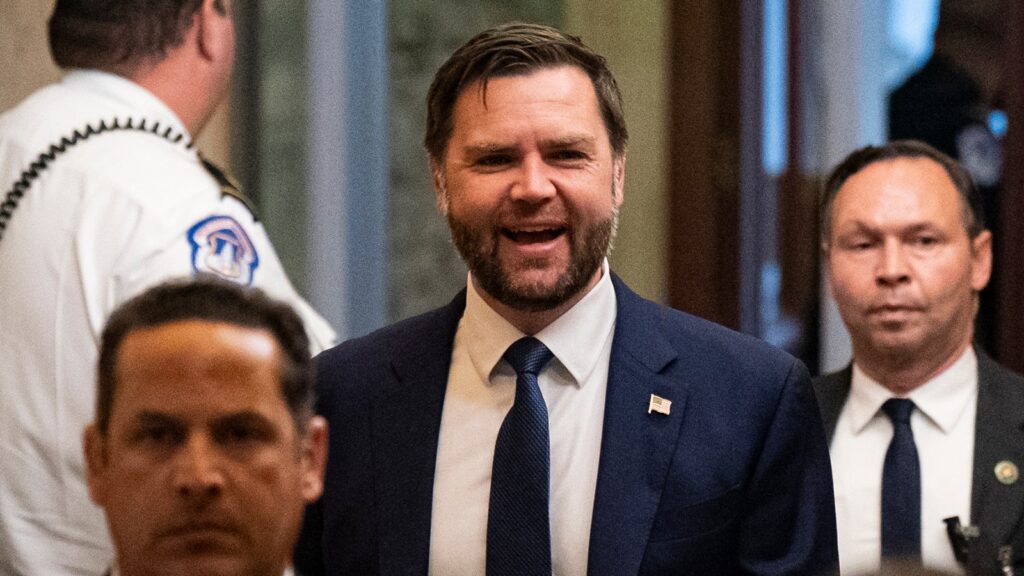
President Donald Trump and the GOP’s ambitious “One Big Beautiful Bill” has sparked widespread controversy, drawing criticism for its potential to create significant barriers to accessing essential programs like Medicaid and food assistance. Amidst these concerns, Vice President J.D. Vance has adopted a new strategy to sway public opinion: emphasizing the bill’s substantial funding for Immigration and Customs Enforcement (ICE) while dismissing other contentious elements as “minutiae.”
Vance, in a post on social media platform X, stated, “The thing that will bankrupt this country more than any other policy is flooding the country with illegal immigration and then giving those migrants generous benefits. The [One Big Beautiful Bill] fixes this problem. And therefore it must pass.” He further added, “Everything else — the CBO score, the proper baseline, the minutiae of the Medicaid policy — is immaterial compared to the ICE money and immigration enforcement provisions.”
Massive Funding for ICE Amid Budget Concerns
The House-approved version of the legislation allocates over $100 billion to ICE for constructing new immigration detention centers, enhancing arrest and deportation efforts, militarizing the border, and hiring additional agents. This funding surge comes as ICE has already exceeded its annual budget well before the fiscal year ends. During a U.S. Senate Appropriations Committee hearing in May, Sen. Chris Murphy (D-Conn.) criticized the Department of Homeland Security’s (DHS) spending under Secretary Kristi Noem.
“You are spending like you don’t have a budget. You are on the verge of running out of money for the fiscal year […] You are ignoring the immigration laws of this nation, implementing a brand-new immigration system that you have invented that has little relation to the statutes that you are required — that you are commanded — to follow as spelled out in your oath of office,” Murphy stated.
Political Implications and Public Reaction
The reconciliation bill and accompanying presidential policies aim to empower DHS and ICE with broader mandates, a move that has drawn sharp criticism from opponents. White House Deputy Chief of Staff Stephen Miller has reportedly demanded that ICE detain at least 3,000 migrants daily. As the bill progresses through the Senate, Trump and Noem visited Florida to tour the controversial “Alligator Alcatraz,” a migrant detention center located in the Everglades.
During the visit, Trump made a controversial remark, “We’re going to teach them how to run away from an alligator,” demonstrating a zig-zag motion to illustrate how detainees might evade the reptiles. This comment has been perceived by many as indicative of the administration’s harsh stance on immigration.
Broader Context and Expert Opinions
The proposed legislation has not only reignited debates over immigration policy but has also raised alarms about healthcare access. Experts warn that millions could lose Medicaid coverage if the bill passes, a concern dismissed by Vance as insignificant compared to immigration enforcement priorities.
Dr. Lisa Thompson, a healthcare policy analyst, noted, “The potential loss of Medicaid coverage for millions is not a trivial issue. It could lead to increased health disparities and financial strain on already vulnerable populations.”
“The administration’s focus on immigration at the expense of healthcare access reflects a broader shift in policy priorities that could have lasting impacts on American society,” Thompson added.
Looking Ahead: Consequences and Next Steps
As the Senate continues to deliberate the bill, its implications for both immigration policy and healthcare access remain at the forefront of national discourse. The outcome will likely influence the political landscape, shaping future debates on government spending and social welfare programs.
With the bill’s passage uncertain, stakeholders on both sides of the issue are mobilizing to influence the legislative process. The coming weeks will be critical in determining the direction of U.S. immigration and healthcare policy, with potential consequences for millions of Americans.







